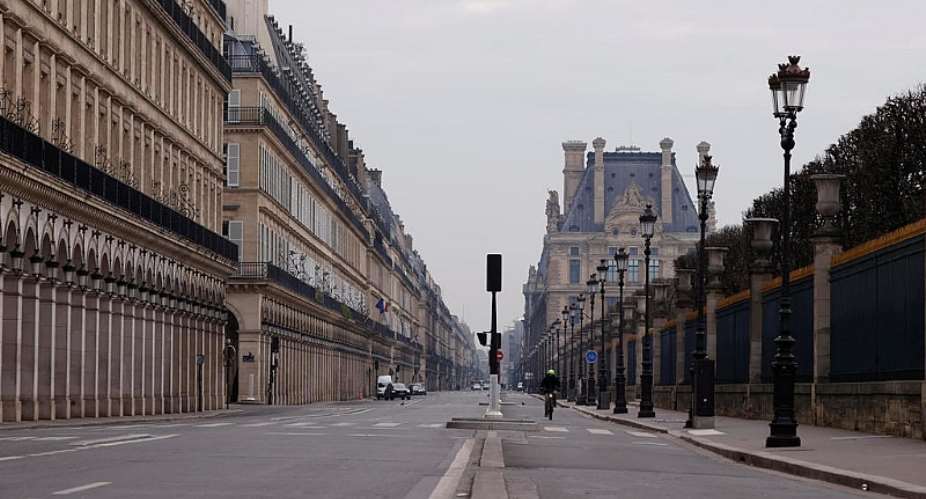Despite no signs of an explosion in new infections, France appears set to enter a third lockdown in an bid to beat the highly-contagious UK variant of the coronavirus. High-placed government sources say it's a matter of days before President Emmanuel Macron makes the announcement.
"The decision to reimpose confinement is on the verge of being announced," the sources told French weekly Journal du Dimanche on Saturday, adding that only the timing and conditions remained to be finalised.
The measure would come into effect before the end of the week, and last at least three weeks. Schools would remain open, according to Education Minister Jean-Michel Blanquer.
As in the two previous cases in March and October, Emmanuel Macron is expected to announce the lockdown in a national address, which is likely to come Wednesday after the government's next defence council.
Preemptive strike
The main concern is the spread of the new highly-contagious virus strain first detected in the UK.
French health experts have been clamouring for weeks for a new confinement. "We must lock down now and then relax the rules as soon as the number of cases decreases," said Renaud Piarroux, head of infectious diseases at the Pitié-Salpêtrière teaching hospital in Paris.
However, there is so far no evidence of an explosion in new infections. On average, the past week (awaiting Sunday's figures) has seen 20,699 new Covid-19 cases per day – not a stark rise on the previous two weeks' averages of 18,248, and 18,218.
Furthermore, on 2 January, France introduced a 6pm curfew, two hours earlier than the rest of the country, on mainly eastern departments, and data from the two following weeks appeared to show a dramatic improvement. On 16 January, the earlier curfew was imposed on the rest of France, but the real impact will not be known for another few days.
The French government, however, fears leaving its move on the UK variant too late, and is wary of sudden surges in other European countries.
Ireland serves as example, with the country going from the lowest number of cases per capita in Europe, in December, to the biggest spike in new infections anywhere in the world, with a startling 312 percent increase (5,100 new cases per day) on 8 January.
The government has also introduced new recommendations to address the rapid spread of the new strain, such as urging the public to use only surgical or FFP2 masks and to scrap handmade fabric masks, which do not filter enough particles. Social distancing guidelines have also been extended to 2 metres.
From Sunday, travellers arriving in France by air or sea from within the European Union will need to provide proof of a negative Covid-19 test.
All of France vaccinated 'by August'
After fierce criticism over a sluggish start to the vaccination campaign, France has now surpassed its initial target of one million people vaccinated by the end of January, Prime Minister Jean Castex announced on Saturday.
To allow more people access to the vaccine, France's High Authority for Health has recommended extending the period between the two injections to six weeks, as opposed to three or four weeks advised by the manufacturers.
Health Minister Olivier Véran says France will be able to vaccinate the entire population by the end of August "if all of the vaccines ordered are approved by European and global health authorities."
"By the end of February, four million will have had the first injection," he said. "By the end of March, that figure will be nine million, then 20 million at the end of April...
"By the end of August, 70 million, that is to say the entire French population, all those who wish to be, will have been vaccinated."
According to a poll on 14 January, 56 percent of French now say they are in favour of getting the injection, a steady rise since figures late last year cemented France's reputation as the world's most vaccine-sceptic nation.





 We’ll no longer tolerate your empty, unwarranted attacks – TUC blasts Prof Adei
We’ll no longer tolerate your empty, unwarranted attacks – TUC blasts Prof Adei
 Bawumia donates GHc200,000 to support Madina fire victims
Bawumia donates GHc200,000 to support Madina fire victims
 IMF to disburse US$360million third tranche to Ghana without creditors MoU
IMF to disburse US$360million third tranche to Ghana without creditors MoU
 Truck owner share insights into train collision incident
Truck owner share insights into train collision incident
 Paramount chief of Bassare Traditional Area passes on
Paramount chief of Bassare Traditional Area passes on
 Two teachers in court over alleged illegal possession of BECE papers
Two teachers in court over alleged illegal possession of BECE papers
 Sunyani: Victim allegedly shot by traditional warriors appeals for justice
Sunyani: Victim allegedly shot by traditional warriors appeals for justice
 Mahama vows to scrap teacher licensure exams, review Free SHS policy
Mahama vows to scrap teacher licensure exams, review Free SHS policy
 Government will replace burnt Madina shops with a new three-story, 120-store fac...
Government will replace burnt Madina shops with a new three-story, 120-store fac...
